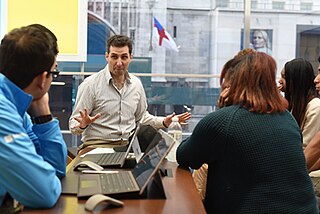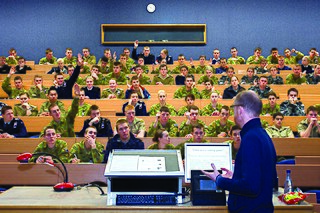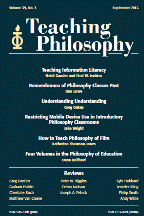 W
WA teacher is a person who helps students to acquire knowledge, competence or virtue.
 W
WEducation is the process of facilitating learning, or the acquisition of knowledge, skills, values, morals, beliefs, and habits. Educational methods include teaching, training, storytelling, discussion and directed research. Education frequently takes place under the guidance of educators, however learners can also educate themselves. Education can take place in formal or informal settings and any experience that has a formative effect on the way one thinks, feels, or acts may be considered educational. The methodology of teaching is called pedagogy.
 W
WAn academic discipline or academic field is a subdivision of knowledge that is taught and researched at the college or university level. Disciplines are defined and recognized by the academic journals in which research is published, and the learned societies and academic departments or faculties within colleges and universities to which their practitioners belong. Academic disciplines are conventionally divided into the humanities, including language, art and cultural studies, and the scientific disciplines, such as physics, chemistry, and biology; the social sciences are sometimes considered a third category.
 W
WThe Beehive Design Collective is a volunteer-driven non-profit art collective that uses graphical media as educational tools to communicate stories of resistance to corporate globalization. The purpose of the Machias, Maine-based group is to "cross-pollinate the grassroots" by creating collaborative, anti-copyright images that can be used as educational and organizing tools. The most recognizable of these images are large format pen and ink posters, which seek to provide a visual alternative to deconstruction of complicated social and political issues ranging from globalization, free trade, militarism, resource extraction, and biotechnology.
 W
WA certified teacher is an educator who has earned credentials from an authoritative source, such as the government, a higher education institution or a private body or source. This teacher qualification gives a teacher authorization to teach and grade in pre-schools, primary or secondary education in countries, schools, content areas or curricula where authorization is required. While many authorizing entities require student teaching experience before earning teacher certification, routes vary from country to country.
 W
WA copybook, or copy book is a book used in education that contains examples of handwriting and blank space for learners to imitate.
 W
WThe gamification of learning is an educational approach to motivate students to learn by using video game design and game elements in learning environments. The goal is to maximize enjoyment and engagement through capturing the interest of learners and inspiring them to continue learning. Gamification, broadly defined, is the process of defining the elements which comprise games that make those games fun and motivate players to continue playing, and using those same elements in a non-game context to influence behaviour. In other words, gamification is the introduction of game elements in a non-game situation.
 W
WThe Harkness table, Harkness method, or Harkness discussion is a teaching and learning method involving students seated in a large, oval configuration to discuss ideas in an encouraging, open-minded environment with only occasional or minimal teacher intervention.
 W
WItinerant teachers are traveling schoolteachers. They are sometimes specialized to work in the trades, healthcare, or the field of special education, sometimes providing individual tutoring. Historically, the term has also been used to describe traveling teachers in regions without formal schools, as well as the sophists of Ancient Greece, the disciples of Jesus of Nazareth, and even Jesus of Nazareth himself. Itinerant lecturers include James Ferguson.
 W
WA lecture is an oral presentation intended to present information or teach people about a particular subject, for example by a university or college teacher. Lectures are used to convey critical information, history, background, theories, and equations. A politician's speech, a minister's sermon, or even a business person’s sales presentation may be similar in form to a lecture. Usually the lecturer will stand at the front of the room and recite information relevant to the lecture's content.
 W
WA lesson or class is a structured period of time where learning is intended to occur. It involves one or more students being taught by a teacher or instructor. A lesson may be either one section of a textbook or, more frequently, a short period of time during which learners are taught about a particular subject or taught how to perform a particular activity. Lessons are generally taught in a classroom but may instead take place in a situated learning environment.
 W
WMusic lessons are a type of formal instruction in playing a musical instrument or singing. Typically, a student taking music lessons meets a music teacher for one-on-one training sessions ranging from 30 minutes to one hour in length over a period of weeks or years. For vocal lessons, teachers show students how to sit or stand and breathe, and how to position the head, chest, and mouth for good vocal tone. For instrument lessons, teachers show students how to sit or stand with the instrument, how to hold the instrument, and how to manipulate the fingers and other body parts to produce tones and sounds from the instrument. Music teachers also assign technical exercises, musical pieces, and other activities to help the students improve their musical skills. While most music lessons are one-on-one (private), some teachers also teach groups of two to four students, and, for very basic instruction, some instruments are taught in large group lessons, such as piano and acoustic guitar. Since the widespread availability of high speed. low latency Internet, private lessons can also take place through live video chat using webcams, microphones and videotelephony online.
 W
WAn object lesson is a teaching method that consists of using a physical object or visual aid as a discussion piece for a lesson. Object lesson teaching assumes that material things have the potential to convey information.
 W
WA public lecture is one means employed for educating the public in the arts and sciences. The Royal Institution has a long history of public lectures and demonstrations given by prominent experts in the field. In the 19th century, the popularity of the public lectures given by Sir Humphry Davy at the Royal Institution was so great that the volume of carriage traffic in Albemarle Street caused it to become the first one-way street in London. The Royal Institution's Christmas Lectures for young people are nowadays also shown on television. Alexander von Humboldt delivered a series of public lectures at the University of Berlin in the winter of 1827–1828, that formed the basis for his later work Kosmos.
 W
WThe most commonly used definition of school belonging comes from a 1993 academic article by researchers Carol Goodenow and Kathleen Grady, who describe school belonging as "the extent to which students feel personally accepted, respected, included, and supported by others in the school social environment." The construct of school belonging involves feeling connected with and attached to one's school. It also encompasses involvement and affiliation with one's school community. Conversely, students who do not feel a strong sense of belonging within their school environment are frequently described as being alienated or disaffected. There are a number of terms within educational research that are used interchangeably with school belonging, including school connectedness, school attachment, and school engagement.
 W
WA social narrative is a learning tool designed for a person with a condition such as an autism spectrum disorder that teaches them how to do something new. It is referred to as a story or a written explanation that tells the learner not only what to do but also what the situation is, with the goal of addressing the challenge of learners finding social situations confusing.
 W
WTeach: Tony Danza is an American reality show about actor Tony Danza becoming a tenth-grade English teacher at Northeast High School in Philadelphia, Pennsylvania, during the 2009–2010 school year. The show premiered October 1, 2010 on A&E. Filming took place predominantly during the first semester of the school year, with a few unaired scenes shot at the end of the second semester. Production was halted at the end of the first semester after the producers felt that existing footage was not dramatic enough, and after Danza refused to allow the producers to try to generate drama among his students. The existing footage was used to create the seven episodes that aired. Tony continued to teach his class until the end of the school year and returned for a few years after the show aired as a commencement speaker at graduation.
 W
WTeacher leadership is a term used in K-12 schools for classroom educators who simultaneously take on administrative roles outside of their classrooms to assist in functions of the larger school system. Teacher leadership tasks may include but are not limited to: managing teaching, learning, and resource allocation. Teachers who engage in leadership roles are generally experienced and respected in their field which can both empower them and increase collaboration among peers.
 W
WTeachers' Day is a special day for the appreciation of teachers, and may include celebrations to honor them for their special contributions in a particular field area, or the community in general.
 W
WTeachers TV was a UK government–funded website and former free-to-air distance education television channel which operated from 2005–2011. The website provided video and support materials for those who work in education, including teachers, school leaders, governors, teacher trainers, student teachers and support staff.
 W
WThe Teaching and Learning Research Programme (TLRP) was the United Kingdom's largest investment in education research. It was initiated in 2000, ended in 2011 and was managed on behalf of the Higher Education Funding Councils by the Economic and Social Research Council. The programme engaged 700 researchers in some 70 major projects. These covered all education sectors - from Early Years to Higher Education and Workplace Learning. The TLRP researchers work closely in partnership with practitioners to ensure the relevance and application of findings to policy and practice. Thematic work across the diverse range of projects enabled analysis of themes and the identification of 'ten principles for effective teaching and learning'.
 W
WThe teaching philosophy of a candidate for an academic position, sometimes referred to as a teaching philosophy statement, is a written statement of the candidate's general personal views on teaching. Colleges and universities that advertise a position whose duties require teaching often require the applicant to submit a teaching philosophy with the application. Teaching philosophy statements are becoming increasingly required in the attainment of teaching positions. Teaching philosophy statement often attempts to express what methods of teaching the candidate practices and what educational styles they intend to make use of. Teaching philosophy statements are generally reviewed and updated as educators gain more experience to reflect their current views and beliefs.
 W
WTeaching Philosophy is a peer-reviewed academic journal devoted to the practical and theoretical discussion of teaching and learning philosophy, that is philosophy education. Established by Arnold Wilson in 1975, it has published over 2,500 articles and reviews in this field. Notable contributors include Norman Bowie, Myles Brand, Peter Caws, Angela Davis, Daniel Dennett, Alasdair MacIntyre, Rosalind Ladd, Michael Pritchard, Anita Silvers, and Robert C. Solomon. Members of the American Association of Philosophy Teachers and the Philosophy Learning and Teaching Organization have access as a benefit of membership. This journal has a Level 1 classification from the Publication Forum of the Federation of Finnish Learned Societies. and a SHERPA/RoMEO "green" self-archiving policy. It is published on behalf of the Teaching Philosophy Association by the Philosophy Documentation Center.
 W
WThe Testerian catechisms (Spanish: Catecismos testerianos) are religious documents used in the evangelization of the New Spain. They explain the Catholic doctrine through images based on indigenous conventions prior to the Conquest of Mexico and western Spanish writing and other languages. These documents were an attempt to be educative materials for those religious that did not know the aboriginal languages then spoken in the territory that is now Mexico. They received their name for Jacobo of Testera, a Franciscan friar who elaborated catechisms of this type.
 W
WTutor expertise in adult education, through the use of content and process experts, is important in the successful delivery of adult education. Each has a specific role and a particular set of attributes which they bring to the classroom. Content experts are those who are well acquainted with the subject. Either through years of practical experience or involvement with research, these individuals fully understand the topic they are discussing. On the other hand, the process expert is trained in the art of teaching. These individuals have a working knowledge of the subject for discussion but they will also have a concrete knowledge of facilitation and how to direct the student to assess their knowledge gaps and seek out answers on their own. Tutors may be totally content focused, totally process focused or some combination of the two, bringing with them prior personal and professional experience.
 W
WTutoring is academic support provided by a master teacher; someone with deep knowledge or defined expertise in a particular subject or set of subjects.
 W
WTutoring is academic support provided by a master teacher; someone with deep knowledge or defined expertise in a particular subject or set of subjects.
 W
WWorld Teachers' Day, also known as International Teachers Day, is an international day held annually on 5 October. Established in 1994, it commemorates the signing of the 1966 UNESCO/ILO Recommendation concerning the Status of Teachers, which is a standard-setting instrument that addresses the status and situations of teachers around the world. This recommendation outlines standards relating to education personnel policy, recruitment, and initial training as well as the continuing education of teachers, their employment, and working conditions. World Teachers' Day aims to focus on "appreciating, assessing and improving the educators of the world" and to provide an opportunity to consider issues related to teachers and teaching.